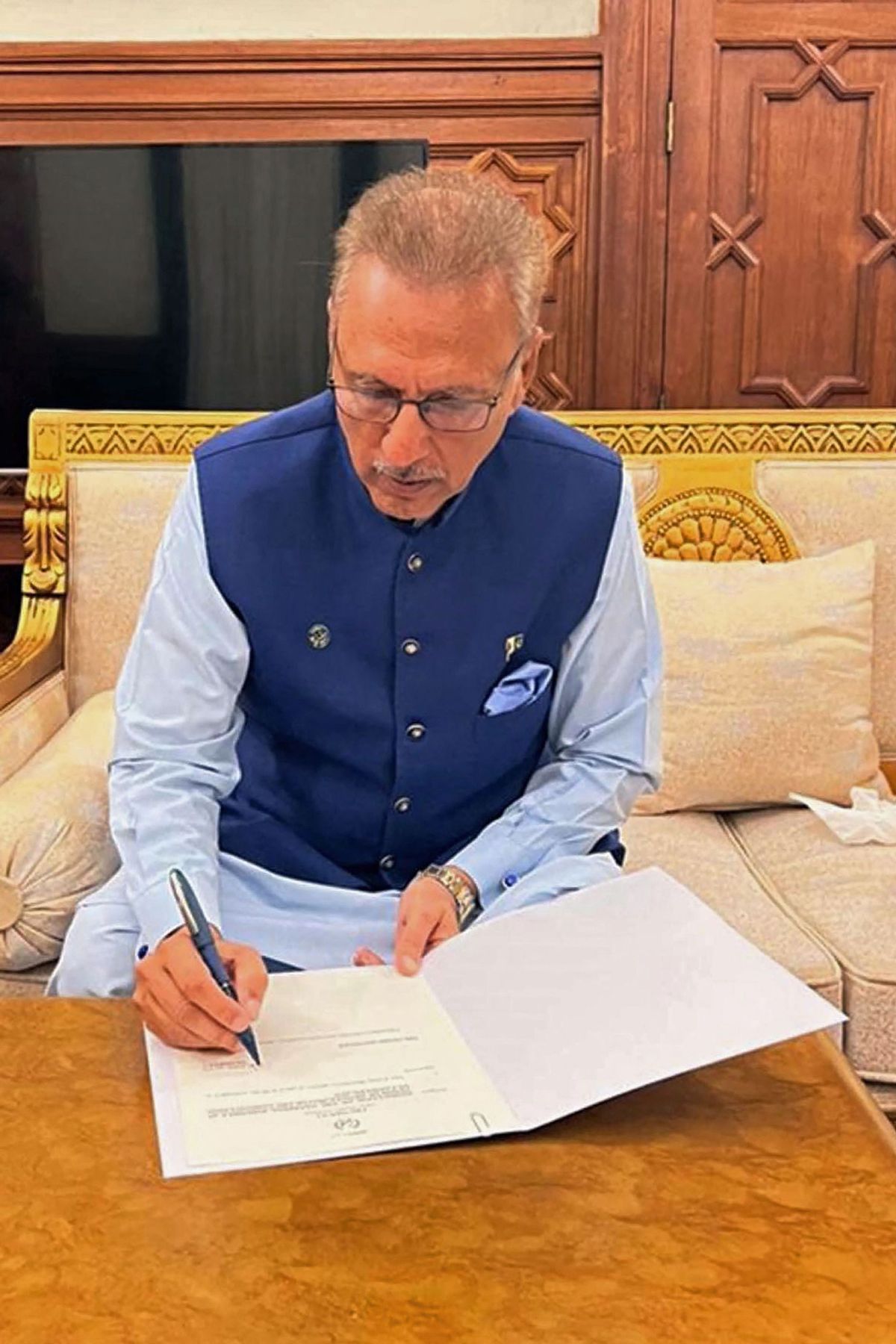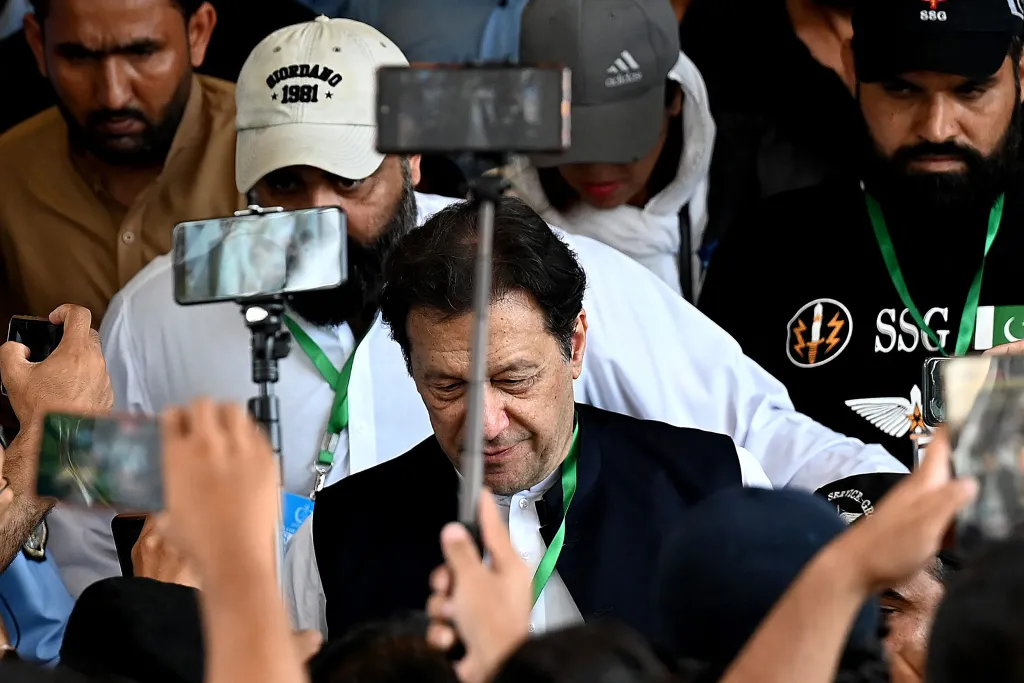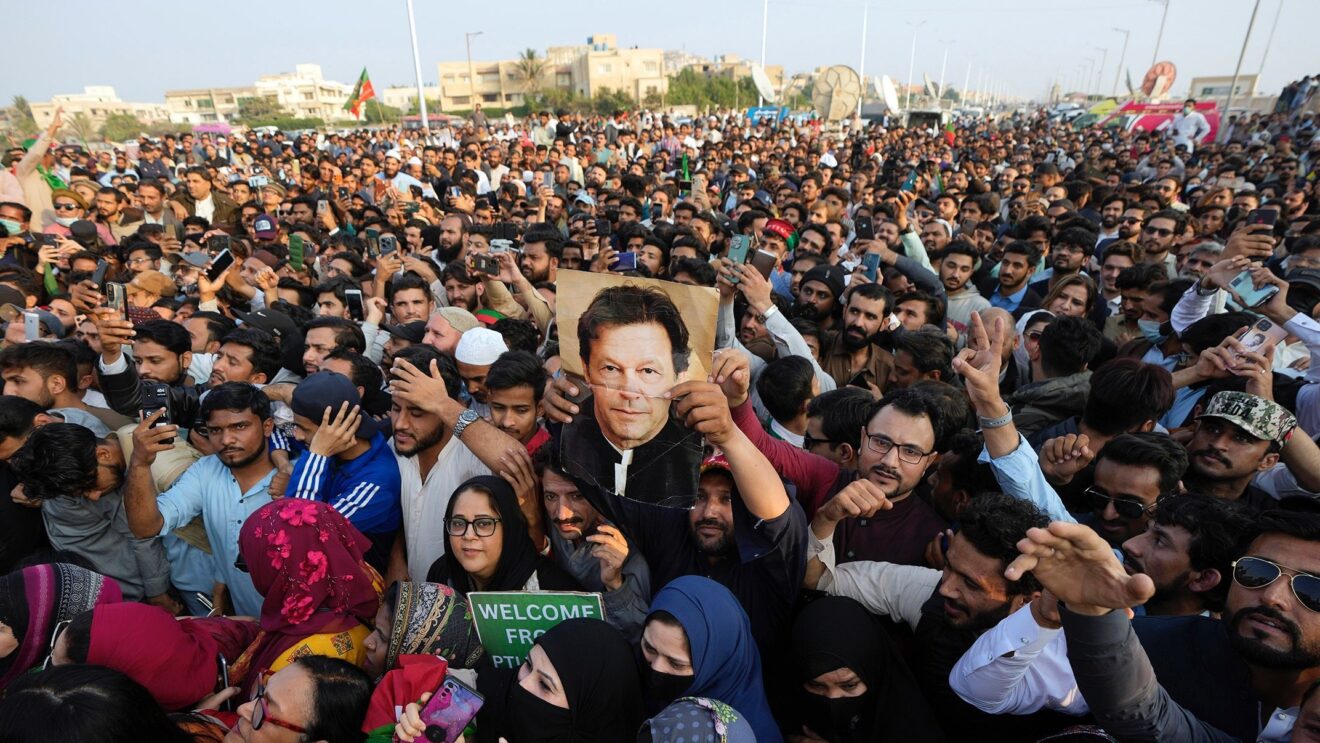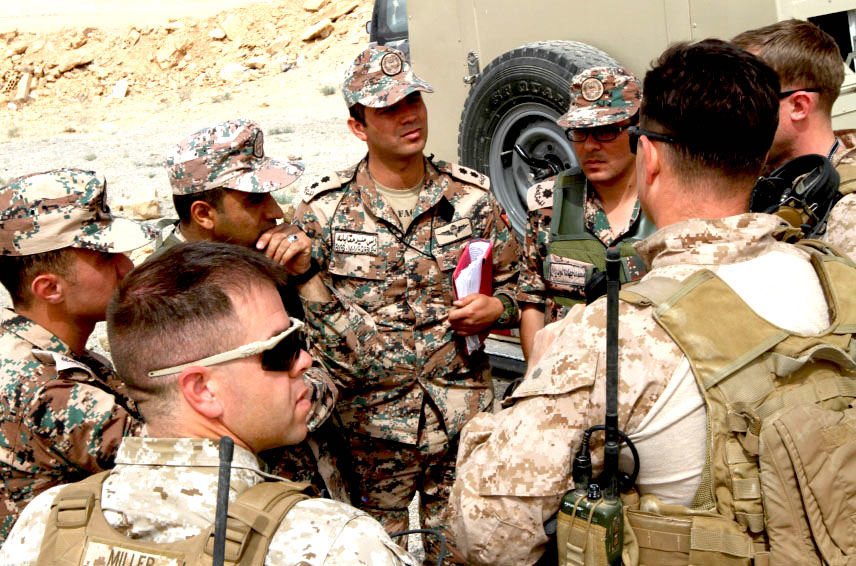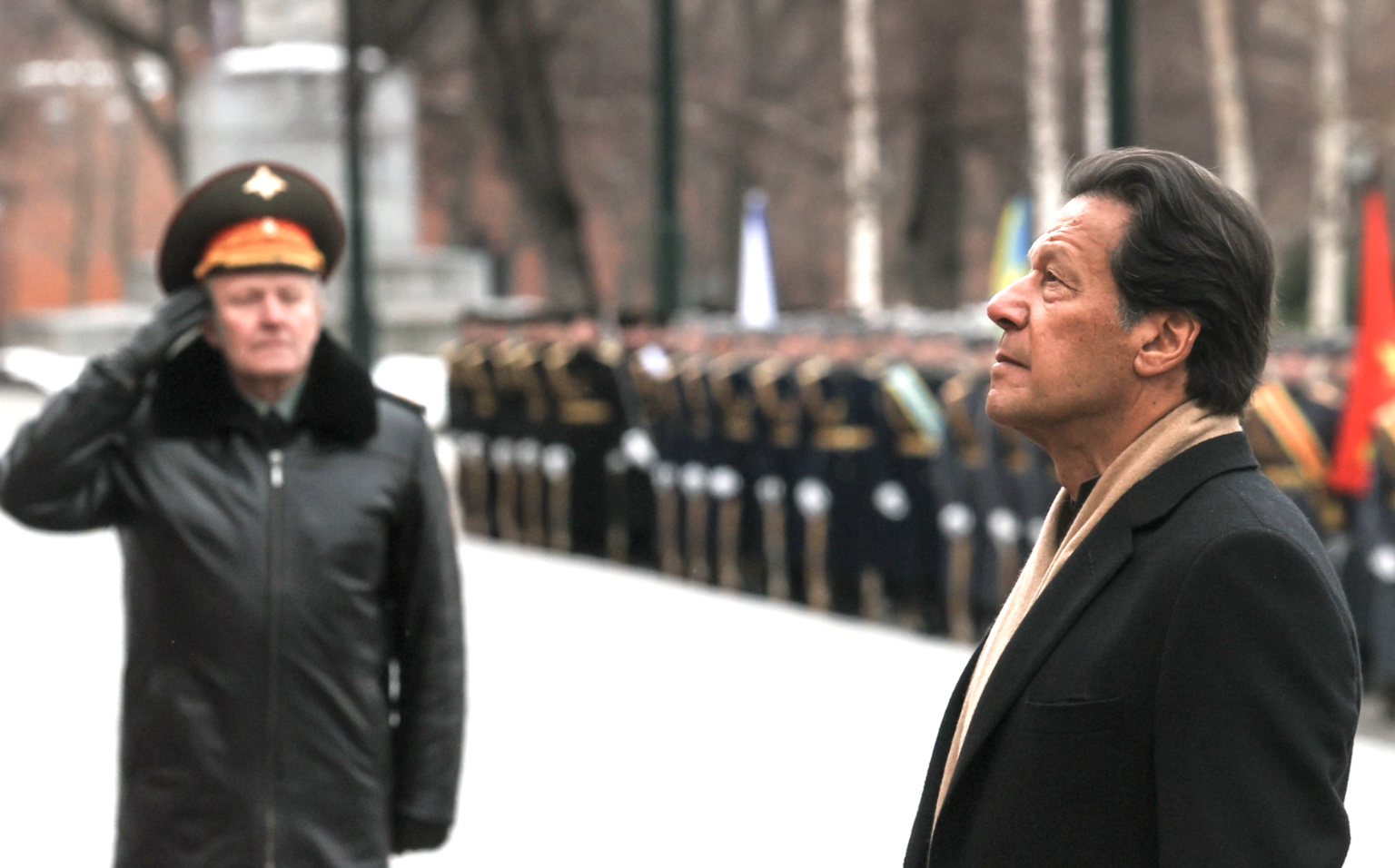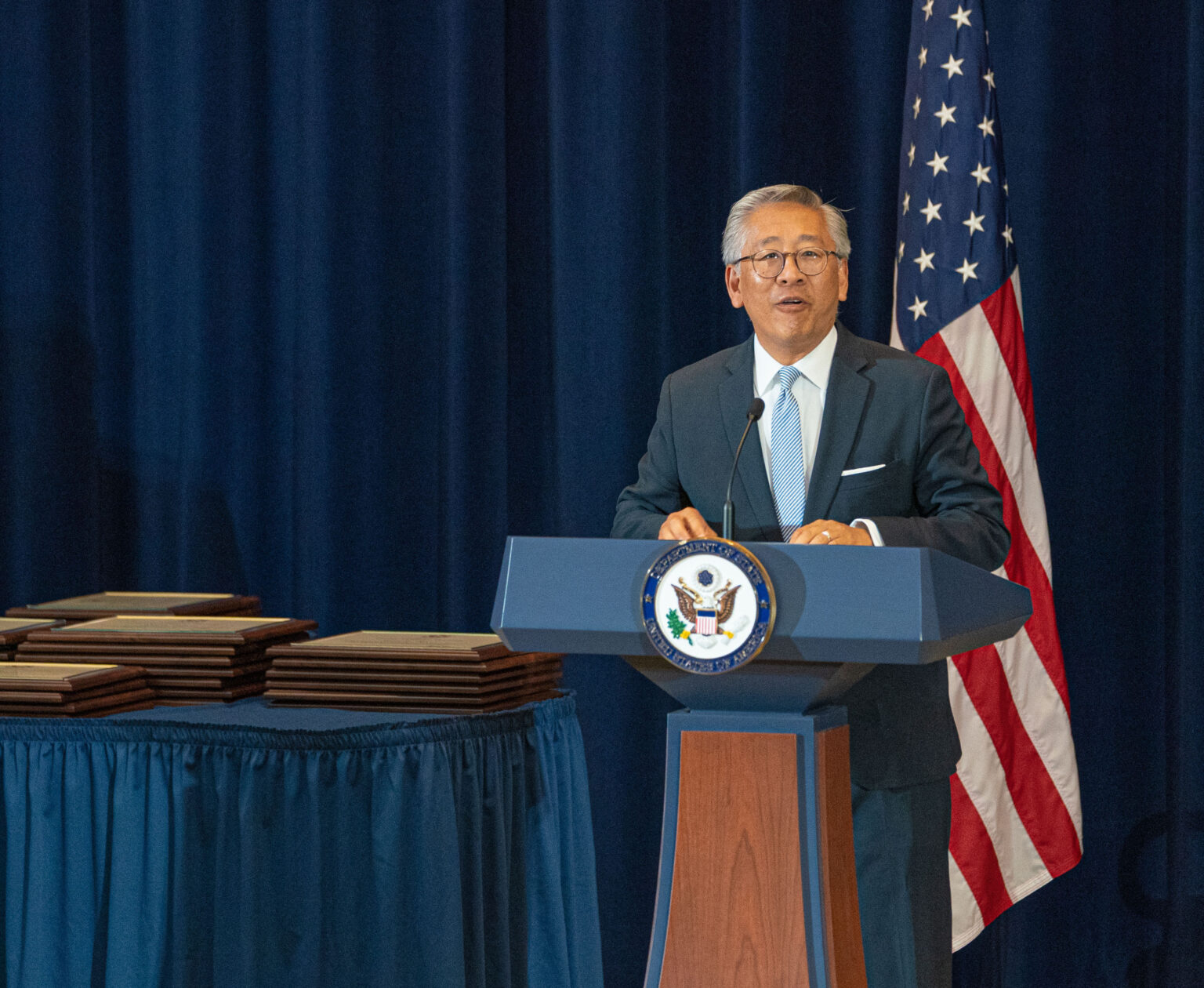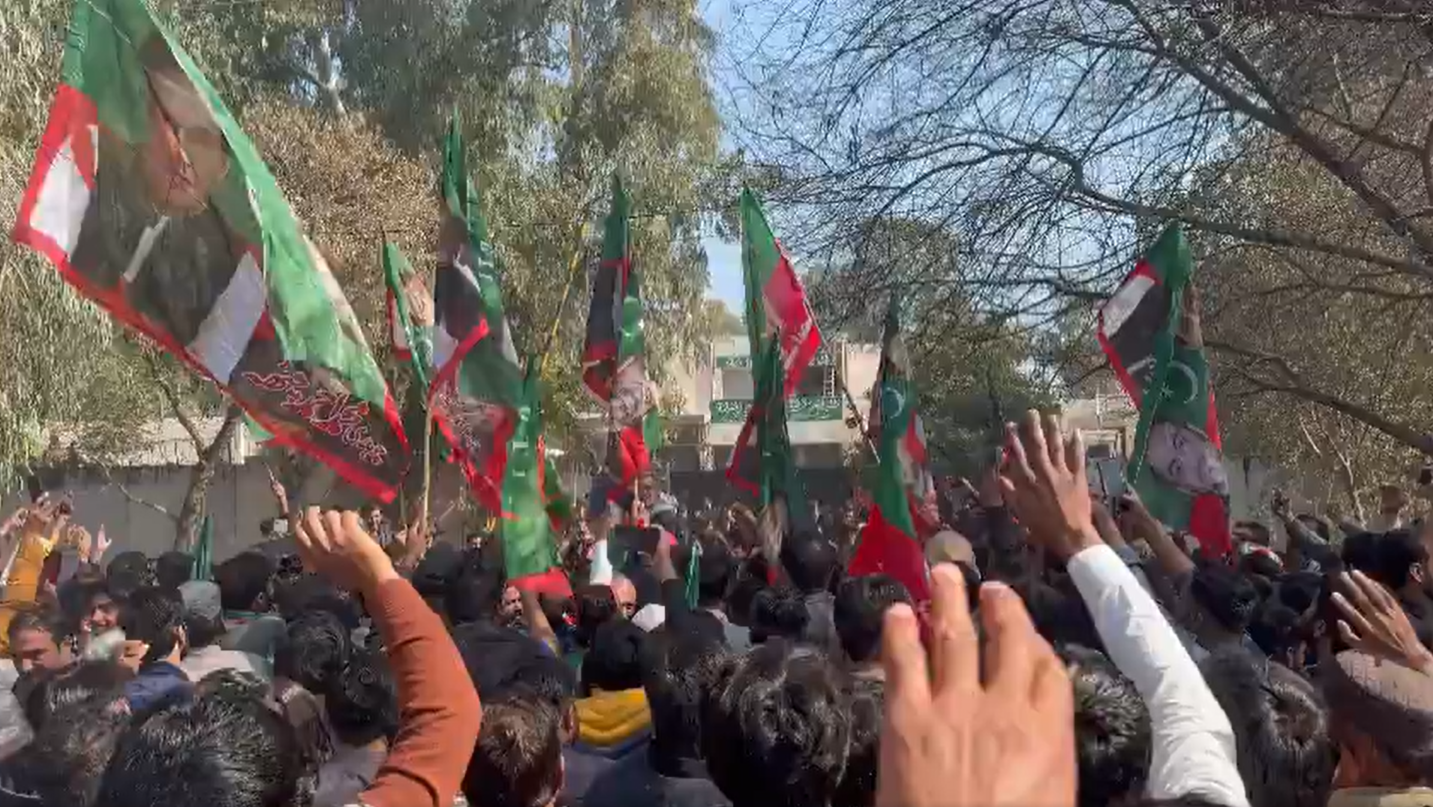
Protestors-Police Clash in Pakistan. May. 11, 2023. | Photo: Twitter/@KTNews11
Published 11 May 2023
"...1,393 civilians and 357 law enforcement officers were among the injured parties..."
On Thursday, According to medical and law enforcement authorities, a significant number of casualties, comprising no less than ten fatalities and more than 1,750 injuries, have resulted from the confrontations between demonstrators and law enforcement personnel in Pakistan after the apprehension of the former Prime Minister, Imran Khan.
Various sources from both police and medical centers have informed that the fatalities resulting from the incident in question were exclusively those of civilians.
In addition, the sources disclosed that 1,393 civilians and 357 law enforcement officers were among the injured parties.
The altercation erupted after the mobilization of the workers affiliated with Khan's Pakistan Tehreek-e-Insaf (PTI) party, who resorted to public demonstrations due to Khan's detainment.
On Tuesday, Khan was apprehended by the National Accountability Bureau (NAB) on purported grounds of corruption and corrupt activities.
This occurred while he was attending a hearing for other legal cases that implicated him, at the premises of the Islamabad High Court.
The federal government of the nation has instituted the deployment of the national army within the capital city of Islamabad, as well as in the prominent cities situated within the provinces of Khyber Pakhtunkhwa and Punjab.
https://www.telesurenglish.net/news/10- ... -0005.html
************
Imran Khan’s Arrest Will Bring Pakistan’s Year-Long Crisis Much Closer To Its End Game
MAY 12, 2023
By Andrew Korybko – May 9, 2023

The Establishment crossed the opposition’s red line as part of their latest power play, practically daring people to publicly defy them and thus put their lives on the line, yet a large number of them are doing precisely that out of patriotic fervor since they fear losing their country.
The post-modern coup that removed former Pakistani Prime Minister Imran Khan (IK) from office last April as punishment for his multipolar foreign policy catalyzed cascading crises across the economic, judicial, political, and security spheres that have shaken this South Asian state to its core. The US-backed regime that was installed in his place refuses to hold free and fair elections as early as possible since they know they’d lose after the former premier’s PTI party won multiple by-elections over the past year.
During that same time, the post-modern coup regime viciously cracked down on society by abducting dissidents and censoring the media out of desperation to retain power. Far from pressuring the Pakistani people into silence and forcing them to accept what IK calls their imported government, they continued peacefully protesting for the right to exercise their democratic will sooner than later. Only upon resolving Pakistan’s political crisis in that manner, these patriots believe, can the other ones then be tackled.
To their credit, they remained committed to this path despite last November’s assassination attempt against IK that he blamed on The Establishment, the raid on his home in mid-March, and the Interior Minister’s continued death threats against him. Their red line was always that he wasn’t to be arrested on trumped-up charges as part of the post-modern coup regime’s lawfare since this scenario would pose a threat to his life due to The Establishment’s reputation and also likely doom any democratic solution.
That red line was just crossed after dozens of Ranger paramilitary forces stormed an Islamabad courthouse to abduct him on Tuesday in a move that former PTI Human Rights Minister Shireen Mazari described “as if (they were) invading an occupied land”. Nationwide protests were organized in response and are still occurring at the time of this analysis’ publication, but the post-modern coup regime might exploit this reaction to justify a conventional military coup in the worst-case scenario.
The Establishment’s latest power play is extremely dangerous since these stakeholders already know very well how polarized society has become over the past year. They could have responsibly exerted influence on their political proxies that replaced IK after last April’s regime change to organize free and fair elections as early as possible in order to serve as a pressure valve. That could have averted the cascading crises that followed and just risked reaching their breaking point on Tuesday.
Some sort of pragmatic working arrangement could still have been brokered between them and the PTI in theory upon the latter returning to power as expected in that case, yet no such outcome appears possible now after The Establishment crossed the opposition’s red line as part of their power play. They’re practically daring people to publicly defy them and thus put their lives on the line, yet a large number of them are doing precisely that out of patriotic fervor since they fear losing their country.
In their minds, a new dark age is rapidly descending upon Pakistan, which might never restore the sovereignty that it’s losing by the day as a result of the cascading crises catalyzed by last April’s regime change. They can’t in good conscience sit back and let this happen without knowing in their hearts that they tried doing something tangible to stop it. This explains why they’re literally risking their lives right now protesting against IK’s abduction and all that it entails for their country’s democratic future.
At present, it appears unlikely that The Establishment will relent by releasing him and pressuring their political proxies to publicly agree on a date for holding free and fair elections sometime in the very near future, but that doesn’t mean that their calculations might not change. In any case, it’s clear that Pakistan’s year-long crisis is reaching its end game since there are really only two mutually exclusive outcomes that are possible: a chance at true democracy or continuing to languish under dictatorship.
https://orinocotribune.com/imran-khans- ... -end-game/
*********
Imran Khan: “I Will Come Back with a Strong Government”
Posted by INTERNATIONALIST 360° on MAY 12, 2023
Dure Akram
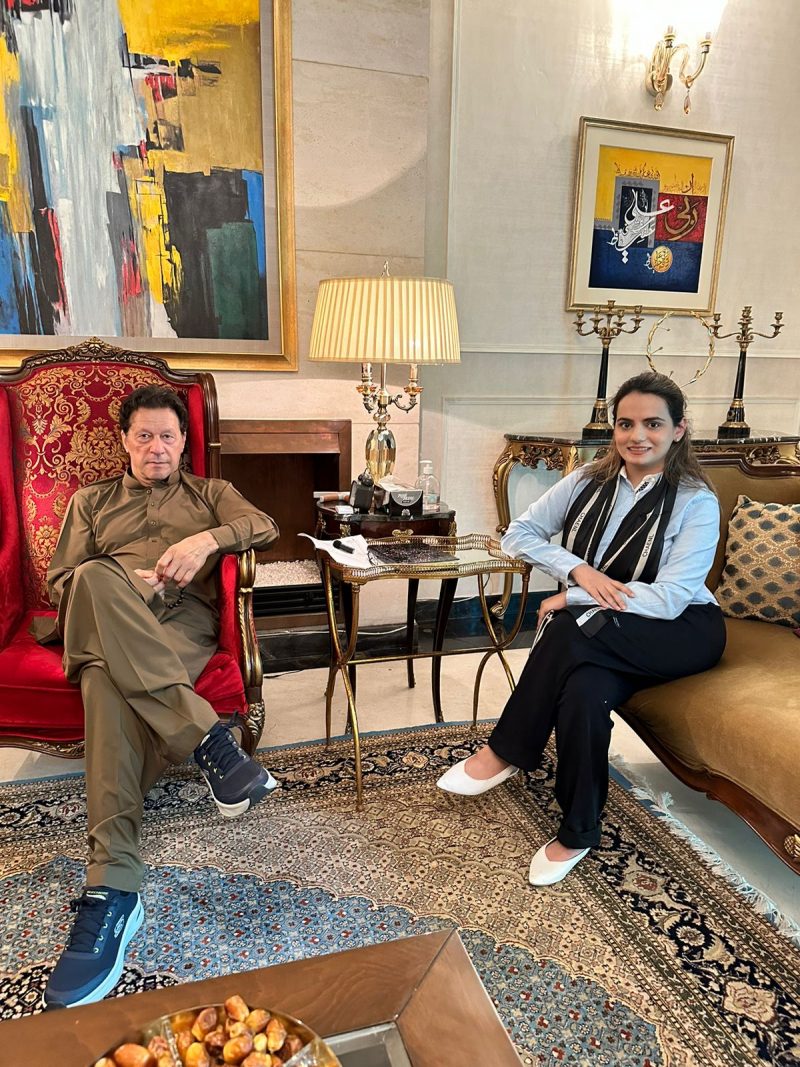
Former Prime Minister Imran Khan during the interview with Dure Akram
Sometimes, a lot can change in a day. While it was only on Monday that United World spoke with former prime minister Imran Khan at his heavily-guarded residence in Lahore, the 70-year-old has since then been arrested from the capital Islamabad by paramilitary officers. Deadly riots and disorder have become the order of the day to protest the intense exchanges in a courtyard where Mr. Khan–who commands the support of millions–had made an appearance to face corruption charges.
Revolutionaries come in all shapes and forms and while former Prime Minister Imran Khan may not look like one, his energetic brushes with the status quo suggest otherwise.
Panicked murmurs of something along the tune of what transpired in the premises of Islamabad High Court on Tuesday (when he was due to appear in a case of corruption allegations) had been running through the country since the night before.
A day earlier, he had sat down with United World International and talked about the “people who want (him) killed.”
“I have very powerful enemies, and all of them are scared of me coming into power,” a very straightforward Mr. Khan noted it just like it was.
Not a believer in holding any punches, he dauntlessly called one of the heads of the local intelligence agency, General Faisal Naseer, allegedly responsible for “not one but two assassination attempts on me.”
“It’s a risk every time I step outside my house”
“It’s a risk every time I step outside my house,” he had prophesied in an eerie manner, “considering their access to all the coercive power and information.”
His heated diatribe against the perpetrators of an assassination attempt on him had, nevertheless, resulted in a rather hard-hitting rebuttal from the public relations wing of the Pakistan Army. In a statement, the director-general had rebuked him for “hurling baseless allegations” against a senior military officer currently serving in the armed forces. Legal action could also be pursued, he warned.
That the president of his party and a staunch ally, ex-chief minister of Punjab Chaudhry Pervaiz Elahi, admitted to pulling the brakes on the registration of the police investigation against the much-talked-about attack on a rally held last year further thickens the plot. Why is the opposition determined to fuel a narrative that reeks of divisiveness when one of their own was not interested in pursuing the complaint, many wonder? Considering the unwillingness of Mr. Khan to put forward any concrete evidence against the accused, some in his inner circle, including a key appointee, Sardar Tanveer Ilyas, have also decided to distance themselves from his allegations.
Visuals making rounds on social media show him composed amid shattered window panes as heavily-armed Rangers step towards him. There are reports of him being dragged across the courtyard. His counsel narrates hits on the injured leg as a sea of uniformed men struck the chairman of Pakistan Tehreek-e-Insaf (PTI), a leading political party.
“All surveys show the PTI is ahead of other parties”
Moving fingers over charcoal prayer beads wrapped carelessly around his left wrist, his beady eyes intent on something far away, Mr. Khan believed in the strength of millions his party pulled. “All the surveys show that the PTI is way ahead of other parties.” His predictions are spot-on, as according to Gallup Pakistan, the ex-premier was overwhelmingly “positively rated” by 61 per cent of Pakistanis. Most of the by-polls held after he was ousted in a no-confidence move last year have been a clean sweep for the PTI. “This is what they are afraid of!” he exclaimed.
The unprecedented cricket icon is no stranger to popularity. Having an illustrious career in international cricket, his historic triumph in the 1992 World Cup rubberstamped him as “the finest cricketer to come from Pakistan.” The charismatic halo continues to this day as people herald him as a true messiah.
But when asked whether, at the height of his fame, he had considered entering politics, he laughed it off. “There is a very clear verse in the Quran. You make one plan and Allah makes another plan. But once I decide to do something, I never fear the consequences.”
“Big mafias have to loose”
“I will do whatever it takes to complete my mission even when it comes at the cost of my life,” he reaffirmed. Known for coining nicknames for his political rivals, he once again mentioned how the “big mafias” had a lot to lose and, therefore, “the stakes were much, much higher.”
At the center of the biggest political storm Pakistan has ever seen, Mr. Khan acknowledged that his life was in danger but continued, “The fear of death should never deter you from your objective, which is the rule of law and justice of Pakistan.”
However, Khan, too, knows that when given a chance, he had failed to fulfill all he had promised during the high-voltage campaign. The justification for their own lackluster performance remains the same as before: weak standing in the executive. Despite a successful election, Imran Khan’s Ministry was formed by forging coalitions with a wide array of partners. “A government needs strength to conduct reforms.”
Strong government needed for reforms
“Pakistan needs reforms in almost every sphere, but most of all in establishing the rule of law”, he maintained.
He called his weak government the biggest obstacle and went on to call out this dependency, as engineered by the Chief of Army Staff of Pakistan, General (R) Qamar Javed Bajwa. “General Bajwa made sure we were not strong enough,” he revealed.
“Between controlling the election commission, the accountability watchdog agency (National Accountability Bureau), and media and hammering out alliances with the two political families (Pakistan Muslim League-Nawaz and Pakistan Peoples Party), he ensured we were weak and would not implement any reform.”
Mr. Khan maintains that Mr. Bajwa played a phenomenal role in obstructing all reforms, the most important of which was “bringing rule of law” because of his influence on the accountability watchdog. “He would make sure the powerful crooks were not convicted,” the former Prime Minister claimed.
When asked about his plans for the future, he emphasized:
“Given the current economic crisis, there would be no point in forming a lame duck government, one without a strong majority or that depends on allies.” He even went on to proclaim that had he known the reality back in 2018, he would have never accepted the government and instantly gone for reelection.
Cautiously smirking at the oft-used phenomenon used to describe the power-sharing formula with the military leadership, Mr. Khan noted that he, too, had once believed they all stood on “one page.” Nevertheless, this union was short-lived as cracks soon appeared in the rosy picture.
Rule of law as the begin of a civilized society
Today, he prioritizes establishing the rule of law as “a beginning of a civilized society for prosperity, democracy and freedom, all follow afterwards.”
Determined to not continue with the “might is right” mantra, he regretted how Pakistan has never had the rule of law.
“The reason why Pakistan is becoming a failed state is our law of the jungle,” he remarked when acknowledging how it had always been under the control of military dictators. If not for martial law, the country was said to be at the mercy of “these family mafias (who) think they are above the law” no matter how many “crimes they commit.”
“Old global power structures are changing”
The unthinkable seems to have taken his party Pakistan Tehreek-e-Insaf (PTI) by surprise, whose supporters are intent on shutting down the country. However, given the dozens of cases ranging from corruption to terrorism to sedition registered within a year of being ousted from power in a no-confidence vote, Mr. Khan might have smelled the battle afar off. After all, he has, on countless occasions, slammed his legal troubles as politically motivated only to distract him from his demand for snap elections. In the first part of this interview, he confidently asserted that he would make a comeback, and that too, with a strong majority, to continue making sweeping reforms in almost all spheres of the country.
In a bid to put our wide-ranging conversation in a nutshell, here are some pertinent takeaways on Mr. Khan’s views on the foreign policy of Pakistan and how he would pursue relations with the outside world once he comes to power:
Pakistan should take India’s foreign policy as an example
On relations with the immediate neighborhood and Muslim bloc
“The problem is when you become part of blocs, you alienate all the other people who are not in the block. I have always maintained that India has one of the best foreign policies. Its very dignified policy guarantees respect in the world because of its independence. India was non-aligned during the Cold War and, subsequently, has a relationship with everyone.
Today, it is a part of the QUAD (Quadrilateral Security Dialogue, UWI) with the United States and yet imported cheap oil from Russia during the Ukraine war. That’s the sort of foreign policy that Pakistan should have.”
“Never thought it was a mistake” to land in Russia on the day of Ukraine operation
On whether his controversial trip to Russia was a mistake
“I never thought (landing into Russia that day, UWI) was a mistake. How were we supposed to know that when I arrived there, Russian forces would be walking into Ukraine? Of course, had I known, I would have delayed the trip. But as it happened, I wasn’t supposed to know. Had President Putin consulted me, I might have delayed my trip.”
On India’s cold reception to Pakistan’s Foreign Minister Bilawal Bhutto-Zardari during a summit held at Goa
“Firstly, let me tell you that it was very foolish of (Bilawal) to go to India. He achieved nothing there except earning humiliation. Running around like a headless chicken all over the world. I don’t know what he has achieved from spending probably millions of dollars on these aimless trips. When I was the prime minister, every foreign trip was evaluated in light of what Pakistan would gain from that trip. At a time when the country is already bankrupt and we are short of dollars, why would anyone go on a trip where he could achieve nothing?
India refuses to come to Pakistan for the Asia Cup. India has point-blank refused to attend any conference in Pakistan so why was this need for Pakistan to rush to India?
Did he think that he was such a good-looking boy that he would win them over? What did he think he was going to achieve there?
The Indian hostility against him was clear as day. He had made remarks against Modi in, I think, New York and he should have been prepared for them not receiving him very well there.
However, this still does not absolve the Indian foreign minister for the disgraceful manner in which he humiliated Bilawal. This goes against all etiquettes of hospitality. When someone is hosting a conference, you do not treat your guests the way he did. And I thought it was very condemnable. It just reeked of arrogance and misplaced arrogance. He probably felt that Pakistan is very weak and therefore, he would get away with these disgraceful comments.”
“Pleased to see” that Saudi Arabia has taken the initiative
On Pakistan being largely unaware of a phenomenal breakthrough between Saudi Arabia and Iran
“I tried my best to decrease the hostilities between Iran and Saudi Arabia. In fact, Prince Mohammed bin Salman had asked for my help and therefore, I went to Iran and went back to Saudi Arabia. We were proposing an end to the Yemen war.
I also tried my best to address and reduce the hostility between Saudi Arabia and Türkiye.
As a Pakistani, I am so pleased that Saudi Arabia has now taken the initiative and mended fences with Iran and Türkiye. This is one of the best news for the whole region, especially considering the prospects of peace in Yemen. The diplomacy of Prince Mohammed bin Salman should be commended because he is moving in the right direction. Saudi Arabia can actually become a pivot for the whole region. There will be more trade, which would lead to prosperity throughout the region.
Look at the European Union. They have raised their standard of living by trading with each other. And now, look at us, we have a huge problem on our Eastern border we can’t trade with them, but then, we’ve hardly invested in any trade with the rest of our neighbors.
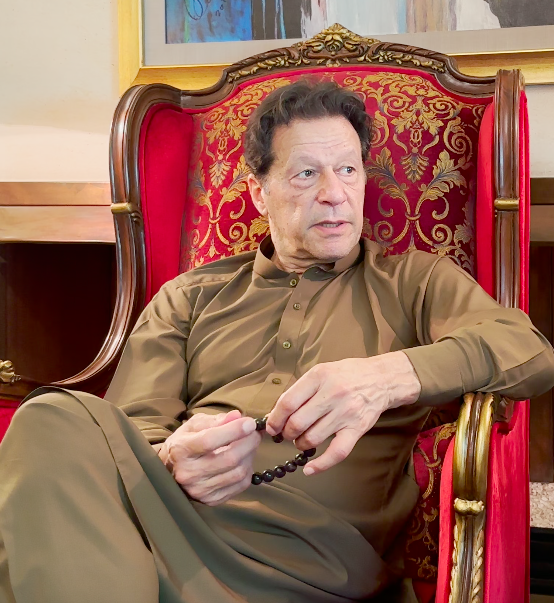
Joint cultural projects of Pakistan and Türkiye against “Westernization”
On pursuing a relationship with Türkiye
“Well, I had a very good relationship with President Erdoğan and we wanted to improve our trade relationship along with working on our cultural relationship. Because of him, I got the telecasting rights to a phenomenal TV drama Ertuğrul. We wished to protect our youth, constantly being bombarded with Western movies that take them away from their culture, are young people. The same is the case with Türkiye where people are getting Westernized and moving away from their own culture. They don’t know about the rich heritage of Türkiye.
We even worked on a collaboration to make joint ventures. One of the proposed films was about this freedom fighter from Pakistan who had fought in Türkiye during the Khilafat movement. We once had a meeting with Malaysia’s Mahathir Mohammad where we wanted all three nations to collaborate in developing our own history, the Muslim history, the Islamic history.
But, linkages take time to develop. You establish contact. Then, you set up a structure and people on the ground start collaborating.
“Erdoğan probably will win, his party is well organized”
When asked about the ongoing general polls in Türkiye
“First of all, I have to state that electing the head of state is the sole prerogative of the people of that country. It’s about what they want, what their preferences are.
But I have to say that for me, President Erdoğan is one of the true statesmen of the Muslim world. Because you know, when we were fighting our case for oppression in Kashmir, he was among the only three heads of countries that spoke out. Others would not even utter a word against India. He has always stood up for causes, you know, represents the Muslim world and people have a great respect for him.
I think he will win. His party is very well organized. You can’t beat a grassroots party like that. I saw the incredible reception he got when he went to the hospital. People there love him.”
“Without holding elections, we cannot have political stability”
On the Chinese Foreign Minister’s advice for Pakistan to work on domestic stability
“Any sensible person, whether a Pakistani or someone from outside Pakistan, if asked about the ongoing mess that Pakistan is embroiled in, would suggest holding elections because elections bring political stability. The path to economic stability follows afterwards.
However, these criminals (referring to the coalition government, UWI) are worried about their stolen wealth, the NROs (National Reconciliation Ordinance, which grants amnesty, UWI) and their handlers are worried about losing their power. Otherwise, everyone in Pakistan knows that without holding elections, we cannot have political stability.”
On a general preference to opt for de-dollarization
“Nothing is permanent. The only permanent thing in the world is change. And I see a change taking place because you can see other blocks like China emerging as an economic giant. Because of the Ukraine war, Russia is also moving in much closer to China than ever. So, I think in the future, you will see, the old global power system will shift, as it always has in history.”
Afghanistan is Pakistan’s “life line” to Central Asia, but government doesn’t establish proper relationship due to “fear from the U.S.”
On the implications of Pakistan hosting the world’s second-largest refugee population while all efforts to get Afghan Taliban’s help in the fight against terror outfits continue to go down the drain
“Actually, it should have been the easiest thing to develop a powerful relationship with this new Afghan government. We were the closest to them and we had already been moving in the right direction when the change took place. Unfortunately, our government was gone and this government had other priorities. Imagine the foreign minister has been all over the world but Bilawal has still not visited Afghanistan. One reason is that he might not come back, but let’s not talk about that.
The most important country for us is Afghanistan. We have a two-and-a-half thousand-kilometer border with them. We don’t have to just focus on the refugee problem. Afghanistan is a future lifeline to Central Asia. That’s why we were working on trade deals. We were talking about a railway line from Uzbekistan all the way through Afghanistan to Pakistan, which would completely change the amount of trade with Central Asia.
Why would they not want to develop a proper relationship with Afghanistan? Because of fear of offending America. This is it. However, our future lies in our own hands. We need a good relationship with Iran, with Afghanistan, with Central Asian countries and hopefully, one day, when a sensible government comes to power in India, with India, because regional trade is one of the most important ways to bring prosperity.
It’s amazing that a state is doing all this out of fear of offending the US. He has spent millions of dollars running around all over the world and yet he has not been to Afghanistan.”
Stability in Afghanistan benefits Pakistan
On the human rights situation in Afghanistan
“The problem is that the Western countries have latched on to the argument that women are not empowered in Afghanistan. That’s just one thing. But the fact is they cannot ignore peace in Afghanistan, which has arrived after 40 years. If you ask the people of Afghanistan, they’ll talk about the peace they are finally seeing after 40 years of conflict. But the Western countries don’t realize this. I mean, they’re not bothered that Afghanistan finally has stability.
This matters a lot to Pakistan because if there’s instability in Afghanistan, it would overflow into Pakistan considering our long border. We had three groups operating from Afghanistan into Pakistan, TTP, ISIL and Baloch separatists. Now, we don’t. So at least, for us, it should be the best thing to finally see peace in Afghanistan and a government that responds.
The previous governments were actually helping the insurgency within Pakistan because they were pro-India. So just because the U.S. is upset, we stop thinking about our future. What could explain that?”
https://libya360.wordpress.com/2023/05/ ... overnment/






